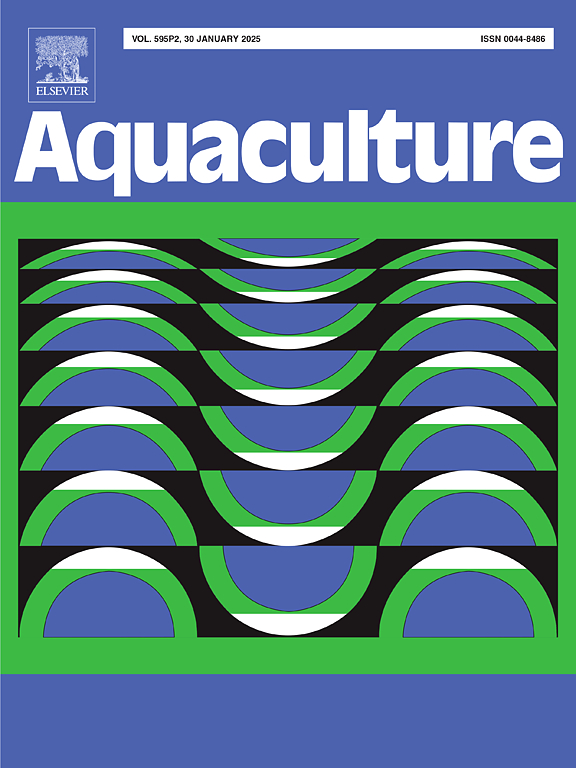综合基因组和功能分析发现NFKBIA是Corbicula mortoni耐盐性的关键调节因子
IF 3.9
1区 农林科学
Q1 FISHERIES
引用次数: 0
摘要
耐盐性对双壳类水产养殖至关重要,特别是对生活在淡水和河口环境中的双壳类。加强对耐盐遗传机制的了解将有助于水产养殖物种的精确育种和有针对性的遗传改良。在这项研究中,我们对Corbicula mortoni进行了全面的比较基因组分析,Corbicula mortoni是Corbicula物种复合体的代表。我们的研究结果表明,免疫和应激相关通路,特别是NF-κ b信号通路,经历了基因家族的扩展。基于全基因组重测序的种群基因组分析显示,淡水种群和河口种群形成了两个不同的集群,其中高度分化的基因组区域包含NFKBIA基因,该基因可能与耐盐性有关。在不同盐度条件下(5和25 psu),利用RNA干扰(RNAi)靶向NFKBIA对河口种群进行功能验证,结果表明,NFKBIA的敲低显著影响了盐度相关基因的表达,并诱导鳃组织发生了明显的组织学变化。这些发现突出了NF-κB通路在mortoni盐胁迫中的关键作用,为双壳类水产养殖耐盐性遗传改良提供了有价值的分子靶点。本文章由计算机程序翻译,如有差异,请以英文原文为准。
Integrative genomic and functional analyses identify NFKBIA as a key regulator of salinity tolerance in Corbicula mortoni
Salinity tolerance is critical for the aquaculture of bivalves, especially for species inhabiting both freshwater and estuarine environments. Enhanced understanding of genetic mechanisms underlying salinity tolerance will support precision breeding and targeted genetic improvement in aquaculture species. In this study, we conducted a comprehensive comparative genomic analysis of Corbicula mortoni, a euryhaline representative of the Corbicula species complex. Our results revealed that immune- and stress-related pathways, particularly the NF-κB signaling pathway, have undergone gene family expansion. Population genomic analysis based on whole-genome resequencing showed that freshwater and estuarine populations formed two distinct clusters, with highly differentiated genomic regions harboring the NFKBIA gene, which is potentially involved in salinity tolerance. Functional validation using RNA interference (RNAi) targeting NFKBIA in the estuarine population under different salinity conditions (5 and 25 psu) showed that knockdown of NFKBIA significantly affected the expression of salinity-related genes and induced marked histological changes in gill tissues. These findings highlight the pivotal role of the NF-κB pathway in the salinity stress of C. mortoni and provide valuable molecular targets for the genetic improvement of salinity tolerance in bivalve aquaculture.
求助全文
通过发布文献求助,成功后即可免费获取论文全文。
去求助
来源期刊

Aquaculture
农林科学-海洋与淡水生物学
CiteScore
8.60
自引率
17.80%
发文量
1246
审稿时长
56 days
期刊介绍:
Aquaculture is an international journal for the exploration, improvement and management of all freshwater and marine food resources. It publishes novel and innovative research of world-wide interest on farming of aquatic organisms, which includes finfish, mollusks, crustaceans and aquatic plants for human consumption. Research on ornamentals is not a focus of the Journal. Aquaculture only publishes papers with a clear relevance to improving aquaculture practices or a potential application.
 求助内容:
求助内容: 应助结果提醒方式:
应助结果提醒方式:


